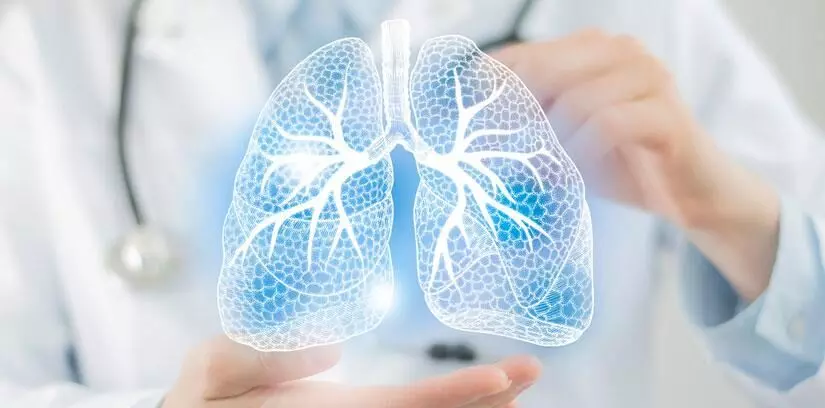World Pneumonia Day How prolonged exposure to polluted air fuels the disease
The thick post-Diwali smog that settles over cities, especially the national capital, not only irritates the throat or eyes but also creates ideal conditions for respiratory illnesses to thrive
By Anoushka Caroline Williams
Hyderabad: World Pneumonia Day is observed on November 12.
The reason to mark the day is to raise awareness about the disease that continues to claim millions of lives globally, particularly among young children and the elderly.
In India, the timing of this day coincides with a crucial period when the air quality dips dramatically after the festive season. The thick post-Diwali smog that settles over cities, especially the national capital, not only irritates the throat or eyes but also creates ideal conditions for respiratory illnesses to thrive.
Among these, pneumonia stands out as one of the most dangerous outcomes of prolonged exposure to polluted air.
While outdoor air pollution gets much of the attention, experts warn that indoor air quality, often worsened by poor ventilation, incense smoke, and cleaning fumes, plays an equally significant role in triggering and aggravating respiratory infections. Together, these environmental factors contribute to the seasonal spike in pneumonia cases seen across India every winter.
The Hidden Connection Between Pollution and Pneumonia
“Pneumonia is an infection in which the air sacs (alveoli) in one or both of the lungs become inflamed and may fill with fluid,” explained Dr. Rakesh Pandit, Senior Consultant & HOD, Internal Medicine, Aakash Healthcare.
“The alveoli are the basic functional units in the lungs that support breathing. When there is widespread inflammation in the air sacs, it can cause respiratory difficulties and make it extremely difficult for a person to breathe or perform basic respiratory activities.”
While pneumonia is treatable, Dr. Pandit added that it can be fatal for certain groups, particularly individuals with a history of respiratory illness, young children, and senior citizens aged 65 and above.
According to scientists, pollution, both indoors and outdoors, plays a significant role in aggravating respiratory infections. Whether it’s smog from firecrackers, vehicular emissions, or biomass burning, the fine particulate matter (PM2.5 and PM10) can enter deep into the lungs, disrupting normal function and increasing susceptibility to infections.
How Smog Weakens the Lungs and Immunity
“Pollution not only increases the frequency of respiratory and flu-like infections (which, for those at risk, can lead to pneumonia), but it can also decrease the body’s innate immune response,” said Dr. Aakaar Kapoor, Founder & Designated Partner, City Imaging & Clinical Labs.
He further explained, “When an individual is exposed to various pollutants in the air, it causes significant inflammation in the lungs and respiratory system. This impairs the immune cell function that helps fight against infection and inflammation in the respiratory tract. With severe pollution levels, such as those experienced during the post-festival season, the filtering system of the respiratory tract and airways weakens, increasing the risk of developing significant lower-respiratory infections.”
This means that the body’s natural defense mechanisms, including the cilia that trap and clear pathogens, function less effectively when constantly exposed to high levels of pollutants. Over time, even mild infections can turn severe, progressing into pneumonia.
Recognizing the Symptoms Early
Pneumonia symptoms can vary from mild to life-threatening. Dr. Manav Manchanda, Director & Head – Respiratory, Critical Care & Sleep Medicine, Asian Hospital, noted that “symptoms may include fever, difficulty breathing, chest pain that is likely to get worse with coughing, sweating, muscle pain, chills, fatigue, loss of appetite, coughing up mucus or blood, nausea and vomiting, and confusion in older adults.”
He cautioned that “severe or untreated pneumonia can result in complications, especially in young children, older adults, and those with suppressed or weakened immune systems.”
Early medical attention, proper hydration, and rest are essential once symptoms appear. Delayed treatment can lead to hospitalization and, in some cases, respiratory failure.
Preventing Pollution-Induced Respiratory Illnesses
Highlighting the importance of preventive care, Dr. Rakesh Pandit said, “To cut down the effects of pollution and reduce complications like pneumonia and other respiratory symptoms, it’s essential to follow necessary preventive measures.”
Some key steps include:
• Avoiding outdoor activity when the Air Quality Index (AQI) levels are high, especially during early mornings and late evenings.
• Children should stay indoors during high smog periods as their lungs are still developing.
• Covering your mouth and nose with a wet cloth or mask if stepping outdoors to minimize inhalation of pollutants.
• Avoiding poorly ventilated and overcrowded spaces, which can amplify infection spread.
• Regular servicing of air conditioners to ensure filters are clean and not recirculating dust or mold.
• Staying updated on vaccinations, especially against pneumococcal bacteria and influenza viruses.
Managing Pre-Existing Conditions and Lifestyle Factors
Dr. Pandit emphasized that older adults and those suffering from chronic diseases such as diabetes or hypertension must manage their conditions effectively. “With poorly controlled conditions, they are more vulnerable to pneumonia and chest infections,” he said.
He further added that smoking, both active and passive, significantly increases the risk of respiratory infections. Cigarette smoke damages the cilia and weakens the immune response, making it harder for the lungs to clear pathogens.
Strengthening the Body’s Defenses
Beyond pollution control, maintaining strong immunity is critical. A balanced diet rich in antioxidants, adequate sleep, hydration, and regular exercise can help the body resist infections more effectively. Incorporating foods rich in vitamins A, C, D, and zinc supports lung health and overall immunity.
On World Pneumonia Day, health experts reiterate that pneumonia is both preventable and treatable, but awareness and timely action are key. As pollution continues to rise post-festivals, individuals must take proactive steps to protect their lungs.
“Air pollution is not just an environmental issue; it’s a public health emergency,” said Dr. Kapoor. “By taking small preventive measures, maintaining hygiene, and getting vaccinated, we can reduce the burden of respiratory diseases and prevent complications like pneumonia.”